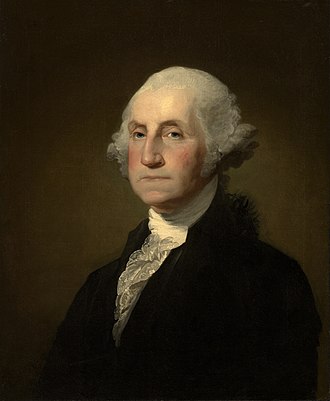 If you’re an American, President George Washington should require no introduction (and I’ll just point you here if you want one). However, knowing about him and studying his thoughts on the matter of the construction of the United States are two entirely different things. Being the first President of the United States, he faced a special challenge in nearly all he did during the time of his Presidency, and perhaps his Farewell Address was not the least of the challenges.
If you’re an American, President George Washington should require no introduction (and I’ll just point you here if you want one). However, knowing about him and studying his thoughts on the matter of the construction of the United States are two entirely different things. Being the first President of the United States, he faced a special challenge in nearly all he did during the time of his Presidency, and perhaps his Farewell Address was not the least of the challenges.
Once beyond his confessions of humility and doubt, President Washington proceeds to delve into the necessary structures of the United States, and the dangers, within and without, which he saw facing it. I entered into reading it wondering if it would be quaint (and its language is definitely not that of today, being more metaphorical) and perhaps out of date.
Half way through it, I find myself wondering why the study of Washington’s Farewell Address is not a required study subject in high school. Not a specialist subject, as it is addressed to all citizens; and its subjects range from a defense of the construction of the government to the lessons learned by a man of now elder years (presumably written in 1797, he would have been sixty five hard-lived years of military and government service). And some are of spectacular relevance to today. I think it would benefit many students to begin contemplating the issues which resound even in today’s society.
I commend its sober reading and meditation upon to you; meanwhile, I’ll pull out some particularly relevant passages and blog about them over the next few weeks.
In contemplating the causes which may disturb our Union, it occurs as matter of serious concern that any ground should have been furnished for characterizing parties by geographical discriminations, Northern and Southern, Atlantic and Western; whence designing men may endeavor to excite a belief that there is a real difference of local interests and views. One of the expedients of party to acquire influence within particular districts is to misrepresent the opinions and aims of other districts. You cannot shield yourselves too much against the jealousies and heartburnings which spring from these misrepresentations; they tend to render alien to each other those who ought to be bound together by fraternal affection. The inhabitants of our Western country have lately had a useful lesson on this head; they have seen, in the negotiation by the Executive, and in the unanimous ratification by the Senate, of the treaty with Spain, and in the universal satisfaction at that event, throughout the United States, a decisive proof how unfounded were the suspicions propagated among them of a policy in the General Government and in the Atlantic States unfriendly to their interests in regard to the Mississippi; they have been witnesses to the formation of two treaties, that with Great Britain, and that with Spain, which secure to them everything they could desire, in respect to our foreign relations, towards confirming their prosperity. Will it not be their wisdom to rely for the preservation of these advantages on the Union by which they were procured ? Will they not henceforth be deaf to those advisers, if such there are, who would sever them from their brethren and connect them with aliens?
One of Washington’s primary themes is that of the inadvisability of Party. I suspect this came from both sad experience, as Party tends to magnify ambition and, potentially, ruthlessness, over duty and loyalty, as well as the recent history exhibited by their late Colonial masters, the English and the many Parties indulged in by elite of England. In this paragraph we see a lesson easily applicable to the Iran nuclear deal, a negotiation adamantly opposed by the GOP for reasons readily dismissed by experts. The opposition soon came to be viewed with puzzlement by those not swayed by Party loyalty, and today I credit jealousy and a terror of being rendered irrelevant to the great political drama of the country for the sad behavior of the GOP; the latter might also explain the inexplicable behavior of their behavior in relation to the ACA.
His theme, at its heart, calls for the greater loyalty to be to Country over Party, and this, of course, make sense, for if our loyalties are greater to Party, then the Country is threatened with dissolution as Parties become geographically-affiliated entities; worse yet, this is a potentially recursive operation, until portions of the former Country are partitioned into small entities, and, not unlike the Greek cities of history, at erratic war with each other.
Such is not conducive to prosperity and progress in vital areas, and leaves humanity in a miserable condition. (See the video in this post for an authoritative voice on matter in today’s society.) Thus, by extension I am willing to bet that he suggests the evaluation of each candidate for office of their own terms, rather than their affiliation with Party: on policy stance, administrative competency, and other such matters. Adherence to Party? That’s the mug’s game.
Although President Washington might select a more graceful phraseology for what is my informal interpretation.




